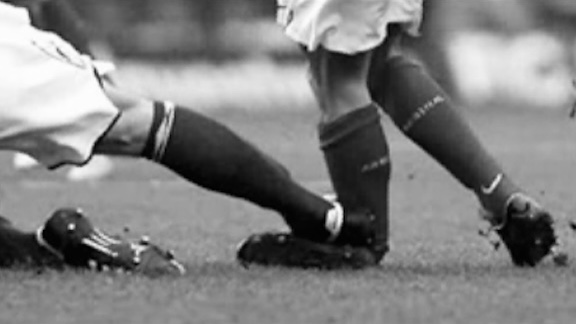As Hard as You Can
Intent is what makes people scary. It’s what you instinctively fear in the criminal. It’s what society breeds out of domesticated humans. But what is it, really? It’s far too slippery to hold in the mind’s eye, an amorphous, ever-shifting gem shrouded in a halo of mystical mist… And what good is that to anyone? If you’ll bear with me, I’ll try to get it to hold still for a moment, throw some sunshine on the cloudy facets and get them to sparkle for you. I’ll do what I can to stabilize the whole thing—gaze into it, into yourself, and get what you can out of it:
Intent is single-minded, goal-oriented focus.
Intent is being focused on injury to the exclusion of all else. From the moment you perceive a threat to the moment that threat is gone, all you care about is causing injury. From the moment someone pulls up their shirt to show you a gun or from the moment you hit the ground face-first, you are on target acquisition and destruction. You will find your targets and smash them, never stopping, never hesitating until you get what you want: an injury. And once you get that first one, you’ll pile them on until the other person physiologically buckles under the mass of trauma and you make them capitulate, pass out, or die as you see fit. Intent is about what you are going to force the other person to do. Intent is making violence once-sided as quickly as possible and keeping it that way.
It’s not an emotional state—you’re not enraged or Hulked-out or seeing red; it’s just that out of all the myriad possible things you could do you are going to pick one (injury) and you’re going to get it done to the exclusion of all else, over and over again. One target, one injury. Repeat until it doesn’t make sense to continue.
Intent is how hard you swing the bat.
Intent is a self-realizing prophecy that cuts both ways—if you think you can do it, you will; if you think you can’t, you won’t. If I ask you to kick a soccer ball, how hard you kick it will depend on what you expect to happen. If you believe that the ball is filled with lead shot, then you’ll expect it to hurt and won’t kick it as hard as you can. In fact, you’ll be very reluctant to kick it at all, and your performance will be a reflection of that reluctance. In a word, it’ll suck.
If I tell you that if you don’t kick it over the fence I’m going to shoot you in the head, your performance will suffer even more. Your preoccupation with a negative outcome will sabotage your efforts. Your mind will not be focused on the task at hand. You’ll be worried about living and dying while simultaneously trying to succeed.
Focus on reality as it stands, not on all possible outcomes. Focusing on things that may or may not be true, or are demonstrable falsehoods, is the “feeding the phantoms” that we discussed previously. Thinking that there’s nothing you can do, or that you cannot injure the other person, or that you’re going to die are all outright lies until proven true. Why put your efforts into your own defeat? It does nothing to aid you in shaping the reality you want. In violence, the reality you want is the one where the other person is injured. Everything you do must get you there by the shortest possible route. To consider failure is to aid in your own destruction.
Intent is how much of yourself you’ll put into getting it done.
Here’s a nifty fact: the one thing that all survivors have in common is that they believed they could survive. The circumstances are immaterial, whether it’s a crash, drowning, fire, wilderness, or violence. Survivors report time and time again that when they reached the lethal decision point—am I going to live or die?—they all unequivocally, steadfastly chose to live. They believed they could. I’ve never heard a survivor say, “and then I quit and waited to die.” (Okay, to be fair, I have heard that—but this was from the ones who were saved by others who refused to give it up.) Survivors believe they can alter the outcome.
So, back to the soccer ball. If I hand it to you so you can feel how light and eminently kickable it is, and then tell you that our goal for this training session is to see how far you can kick it, then you are free to work on the mechanics of running up and kicking it with your whole being.
This is what we are attempting to do with our training, only instead of kicking soccer balls we’re kicking people in the groin. If you show up with false assumptions, believing that even though you felt the ball, and it was indeed light and bouncy, it will still hurt when you kick it, or that you are incapable of kicking a ball very far, then anything I do to train you is for naught. You sabotaged yourself before you even set foot on the pitch. Negative expectations lead to diminished results.
Believing you can do it, expecting to get it done, gets you what you want. Intent comes down to wanting to cause an injury more than anything in the world. Focus your mind in that direction, onto that single vulnerable target, and your body will follow suit. You will plow your entire mass through that throat and crush it. All because of the simple belief that you can do it.
— Chris Ranck-Buhr (from 2006)
PS. Intent makes people scary because it trumps technique. Intent, coupled with a very basic understanding of targeting, will always beat superior technique alone. This is why we always say that techniques are worthless, and that the criminal sociopath, for all their lack of formal training, is a formidable human wrecking machine. These two facts reside on either side of the same coin. If we fuse the two, if we take superior technique and drive it mercilessly with laser-like intent, we end up with the scariest human being possible.
And that would be you.



Leave a Reply
Want to join the discussion?Feel free to contribute!